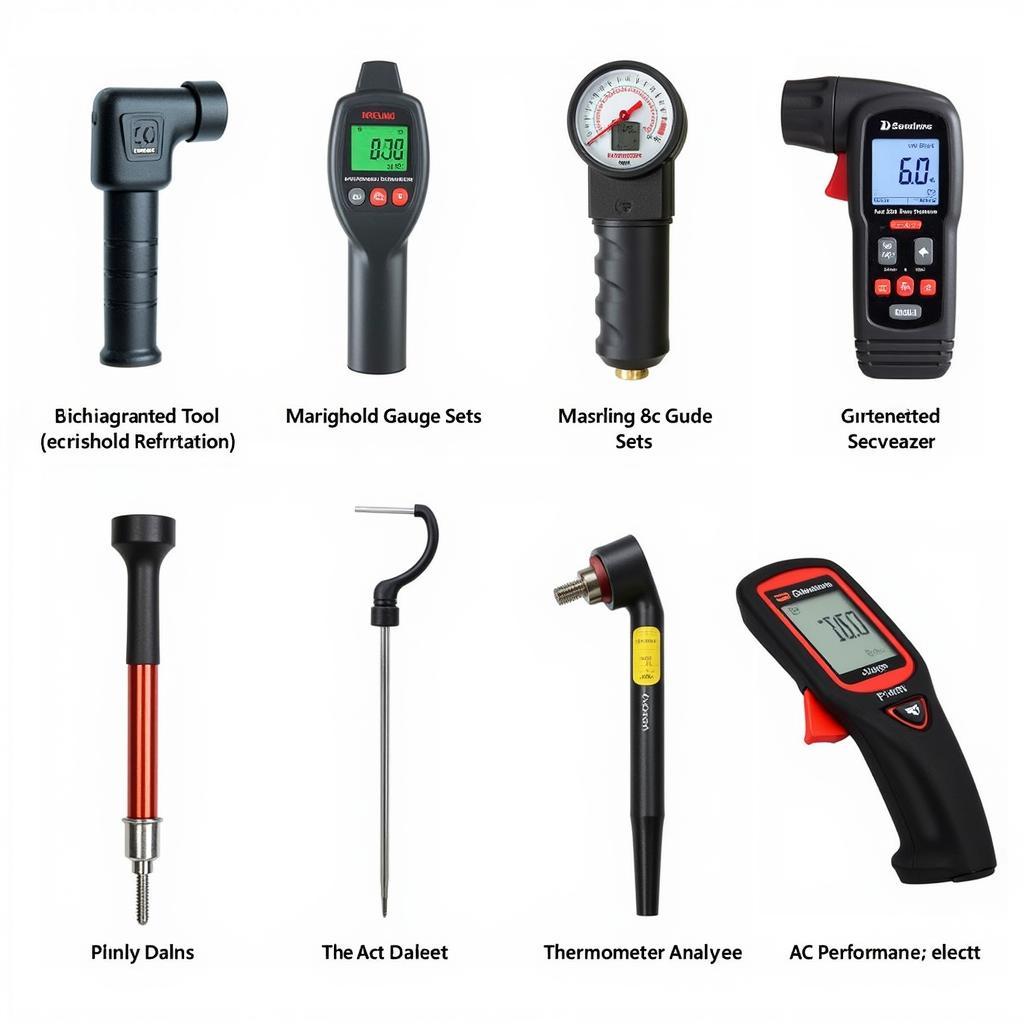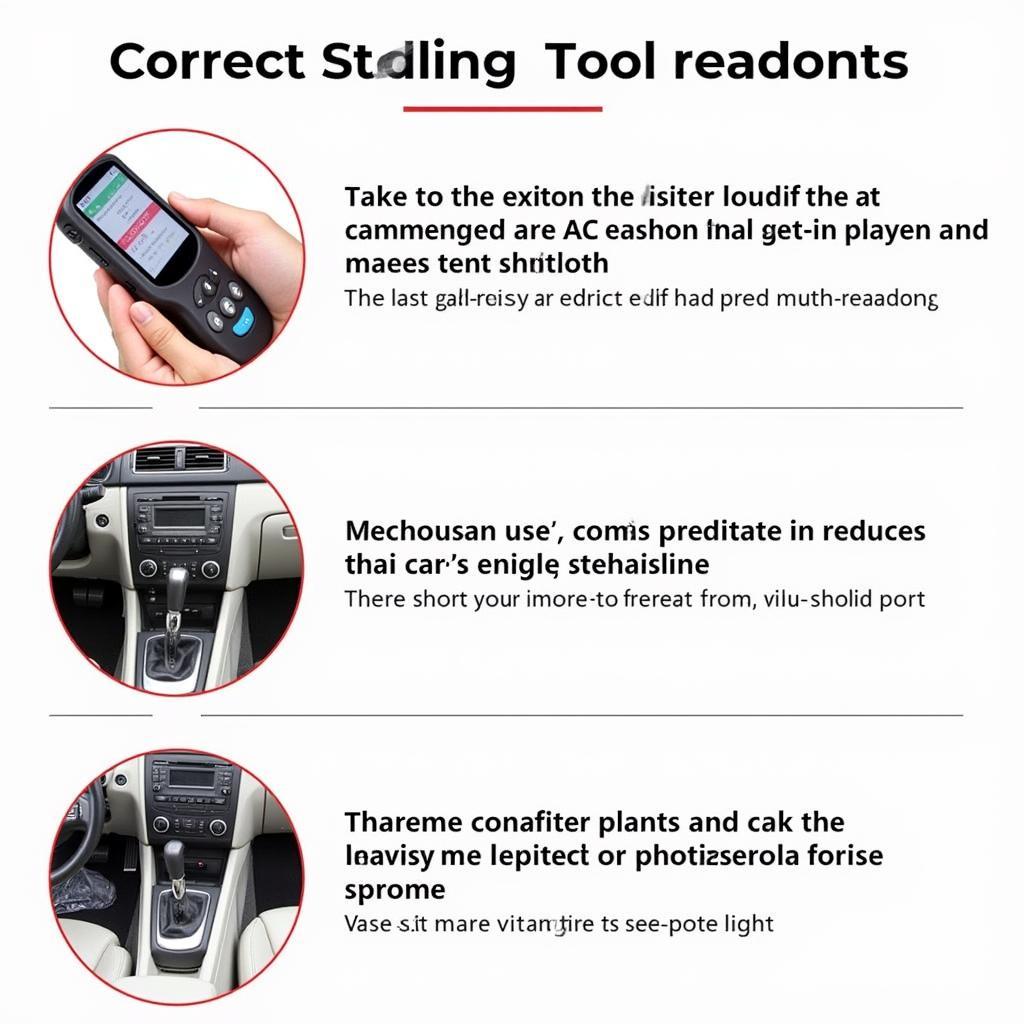Maintaining a comfortable car cabin temperature is crucial for a pleasant driving experience, especially during scorching summers or freezing winters. A malfunctioning AC system can quickly turn a comfortable ride into a miserable one. Thankfully, Car Ac Diagnostic Tools have revolutionized how we troubleshoot and fix these issues. These tools empower car owners, mechanics, and technicians to quickly pinpoint the root cause of AC problems, saving time and money on unnecessary repairs.
Similar to car ac diagnostic tools, understanding the basics of automotive AC systems is crucial for effective diagnostics. The system primarily comprises a compressor, condenser, evaporator, expansion valve or orifice tube, and refrigerant. These components work together to cool and dehumidify the air entering the cabin.
What is a Car AC Diagnostic Tool?
A car AC diagnostic tool is a specialized device designed to analyze the performance and health of a vehicle’s air conditioning system. These tools range from simple pressure gauges to sophisticated electronic scanners that can communicate with the vehicle’s onboard computer. They allow users to identify leaks, measure refrigerant levels, and assess the functionality of various AC components.
What are the benefits of using a car AC diagnostic tool? Using a car AC diagnostic tool can save you valuable time and money by accurately identifying the problem, preventing unnecessary repairs.
Types of Car AC Diagnostic Tools
There are various types of car AC diagnostic tools available, catering to different needs and skill levels. These include:
-
Refrigerant Leak Detectors: These tools help identify leaks in the AC system, which are a common cause of poor cooling performance. They come in various forms, including electronic detectors, UV dye detectors, and nitrogen detectors.
-
Manifold Gauge Sets: These are essential tools for measuring refrigerant pressure and identifying potential issues like low refrigerant, blockages, or faulty components.
-
Thermometers: Accurate temperature readings are crucial for assessing the AC system’s effectiveness. Infrared thermometers can measure the temperature of various components, while digital thermometers can monitor the air temperature inside the cabin.
-
AC Performance Analyzers: Advanced tools can provide comprehensive data about the AC system’s performance. These may include refrigerant pressure and temperature readings, compressor performance, and other critical parameters.
 Different Types of Car AC Diagnostic Tools
Different Types of Car AC Diagnostic Tools
How to Use a Car AC Diagnostic Tool
Using a car AC diagnostic tool effectively requires a basic understanding of the AC system and the specific tool being used. Always consult the tool’s instruction manual for detailed guidance.
-
Safety First: Always wear appropriate safety glasses and gloves when working with the AC system.
-
Connect the Tool: Depending on the tool, you may need to connect it to the AC system’s service ports or the vehicle’s OBD-II port.
-
Follow Instructions: Carefully follow the tool’s instructions to perform the necessary tests and measurements.
-
Interpret Results: Analyze the data provided by the tool to identify the root cause of the AC problem.
 Steps to Use a Car AC Diagnostic Tool
Steps to Use a Car AC Diagnostic Tool
Choosing the Right Car AC Diagnostic Tool
Selecting the appropriate tool depends on your specific needs and budget. Simple tools like refrigerant leak detectors and manifold gauges are suitable for basic troubleshooting. For more advanced diagnostics, consider investing in an AC performance analyzer. Remember to choose tools from reputable brands known for their accuracy and reliability.
Why should I choose a reputable brand? Reputable brands often offer better quality, accuracy, and customer support, ensuring you get a reliable tool and helpful assistance. This is similar to diagnostic tool for mac when looking for quality.
Common AC Problems Diagnosed with Tools
Car AC diagnostic tools can help identify a wide range of AC problems, including:
-
Refrigerant Leaks: These are a common cause of poor cooling performance.
-
Faulty Compressor: The compressor is the heart of the AC system, and a malfunctioning compressor can lead to complete AC failure.
-
Clogged Expansion Valve or Orifice Tube: These components regulate refrigerant flow, and a blockage can disrupt the cooling process.
-
Electrical Issues: Problems with the AC system’s wiring, fuses, or relays can also cause malfunctions.
Similar to saliva as a diagnostic tool article, advancements in diagnostic tools are constantly improving the efficiency of identifying issues.
Conclusion
Car AC diagnostic tools are invaluable for anyone working on automotive AC systems. These tools empower car owners, mechanics, and technicians to quickly and accurately diagnose AC problems, saving time and money on repairs. By understanding the different types of tools available and how to use them effectively, you can keep your car’s AC system running smoothly and enjoy a comfortable driving experience year-round. For further assistance or information on diagnostic tools, feel free to connect with us at ScanToolUS. Our office is located at 1615 S Laramie Ave, Cicero, IL 60804, USA and you can reach us by phone at +1 (641) 206-8880. This is similar in function to cardiac diagnostic tools which aid medical professionals.
FAQ
-
How often should I check my car’s AC system? It’s recommended to have your car’s AC system checked at least once a year, preferably before the start of the hot season.
-
Can I use any car AC diagnostic tool on my vehicle? No, some tools are designed for specific vehicle makes and models.
-
How much does a car AC diagnostic tool cost? The price varies depending on the type and features of the tool.
-
Are car AC diagnostic tools easy to use? Many tools are designed for user-friendliness, but some require specialized knowledge.
-
Where can I buy a car AC diagnostic tool? You can purchase these tools from automotive parts stores, online retailers, and specialized tool suppliers.
-
What are the signs of a low refrigerant level in my car’s AC system? Poor cooling performance, warm air blowing from the vents, and hissing sounds from the AC system can indicate low refrigerant.
-
Can I recharge my car’s AC system myself? While possible, it’s recommended to have a qualified technician handle refrigerant recharging. Similar in approach to windows vista disk diagnostic tool, seeking professional help is advised for certain diagnostic tasks.

